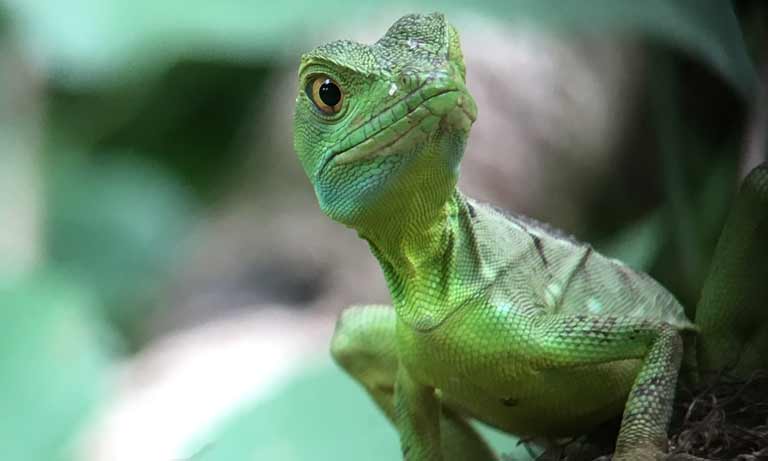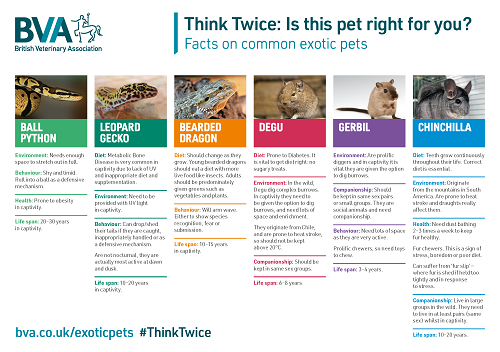Non-traditional companion animals
What's the issue?
Non-traditional companion animals (NTCAs) can have exacting husbandry requirements, and complex social, cognitive, and nutritional needs, which may make them more challenging to keep as pets. There are some species whose five welfare needs are so specialised they can rarely be met in a domestic environment.
Our 2022 Voice of the Veterinary Profession survey found that over eight in ten vets (81%) were concerned that the welfare needs of NTCAs were not being met, with the most cited welfare issues being ‘irresponsible animal ownership’ (82%), ‘irresponsible breeding or sourcing’ (11%), and ‘lack of specialist veterinary care’ (10%). Vets who treat NTCAs report that over half (58%) of the NTCAs they see do not have their five animal welfare needs met.

What's our view?
We strongly support further regulation of the keeping of NTCAs to ensure that only species where there this a high expectation that the Five Domains can be met and that they will have a Good Life are permitted to be kept within domestic settings. This could be achieved through a traffic light system or multi-tier licensing system.
We also consider that:
- Licensing conditions and statutory guidance for pet vending should be consistent across the UK with a single system of detailed minimum standards.
- There should be further regulation of online sales, and in particular advertising on third party sites. PAAG Minimum Standards should be adopted by Government as a basis for regulation of the sector.
- Any person selling any animal should have to register to do so with their Local Authority and display their registration number in all advertising material.
- There should be UK-wide regulation across all pet vendors, with clear definitions and a consistent approach such that rehoming centres, rescues, and sanctuaries are required to meet baseline standards.
- The Dangerous Wild Animals Act is inadequate. Licence applicants/holders should be required to meet a set of minimum standards, mirroring those required for zoos.
- All commercial importers of NTCAs should be licensed and required to meet minimum welfare standards during transport. Industry should develop a transport kitemark to provide assurances that welfare standards have been met throughout the journey.
- There should be an end to the import of wild-caught reptiles and amphibians for non-conservation reasons.
- Ultimately there should be a move away from the wild-capture of fish, alongside the further development of high-welfare captive-breeding programmes for those species of fish whose welfare needs can be met in the domestic environment. There should be improved regulation and traceability of the wild-caught fish trade, with a welfare-outcomes focus and supported by independent audit.
- Vet schools and veterinary nursing colleges should continue to embed the teaching of basic care for NTCAs within their curricula. At the time of graduation, all vets should be able to confidently handle the NTCA species most commonly seen in practice, advise on basic husbandry requirements, conduct a clinical examination, use the medicines Cascade appropriately, identify what it normal for the species, and provide first aid/pain relief and euthanasia.
Non-traditional companion animals policy statement
Non-traditional companion animals executive summary
Get involved
-
Our ‘Think Twice’ infographic and smaller social graphics give some essential facts on six common species of exotic pets, and are available to download below.
-
Contact our policy team for more information.

British Veterinary Zoological Society
FAQs on non-traditional companion animals
Animal Welfare Foundation
Pet advice leaflets
PDSA
Taking care of your pet advice from PDSA
